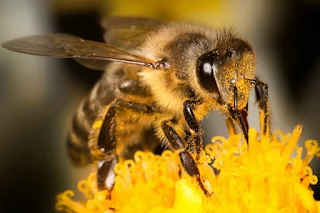As the planet warms and droughts grow longer and more frequent, as predicted by climate scientists, bees are likely to find fewer flowers to get nectar.
When researchers at the University of Exeter and the University of Manchester analyzed the impact of droughts on flower blooms, they found drought conditions halved the number of flowers available to pollinators.
"The plants we examined responded to drought in various ways, from producing fewer flowers to producing flowers that contained no nectar," Exeter ecologist Ben Phillips said in a news release. "But overall there was a very clear reduction in the number of flowers that were available -- and obviously this means less food for flower-visiting insects such as bees."
As a wealth of research has shown, bees are facing a deadly combination of threats, including exposure to pesticides, invasive species and disease.
Bees provide essential ecological services, including the pollination of crops and native plants. They also provide food for a variety of birds and mammals.
(UPI)
13/4/18
-
Related:
When researchers at the University of Exeter and the University of Manchester analyzed the impact of droughts on flower blooms, they found drought conditions halved the number of flowers available to pollinators.
"The plants we examined responded to drought in various ways, from producing fewer flowers to producing flowers that contained no nectar," Exeter ecologist Ben Phillips said in a news release. "But overall there was a very clear reduction in the number of flowers that were available -- and obviously this means less food for flower-visiting insects such as bees."
As a wealth of research has shown, bees are facing a deadly combination of threats, including exposure to pesticides, invasive species and disease.
Bees provide essential ecological services, including the pollination of crops and native plants. They also provide food for a variety of birds and mammals.
(UPI)
13/4/18
-
Related:

No comments:
Post a Comment
Only News